Normative Theory: Analyzing Virtue, Deontology, and Teleology
VerifiedAdded on 2023/06/03
|6
|1751
|468
Essay
AI Summary
This essay delves into the realm of normative theory, examining three primary ethical approaches: virtue ethics, deontological ethics, and teleological ethics. The paper begins by introducing the core concepts of normative theory, which provides a framework for determining right and wrong actions in society. It then explores each ethical approach, providing definitions, advantages, and disadvantages. Virtue ethics, emphasizing character, is contrasted with deontological ethics, which prioritizes adherence to rules and duties. Teleological ethics, focusing on the consequences of actions, is also discussed. The essay uses a real-life scenario to illustrate the application of each approach. The author then argues in favor of teleological ethics, emphasizing its focus on the well-being of others and its practicality in a world where compromises are often necessary. The conclusion reiterates the importance of ethical decision-making, regardless of the situation, and reinforces the value of normative theory in guiding those decisions.

Running head: NORMATIVE THEORY 1
Normative theory
Student Name
Institution
Normative theory
Student Name
Institution
Paraphrase This Document
Need a fresh take? Get an instant paraphrase of this document with our AI Paraphraser
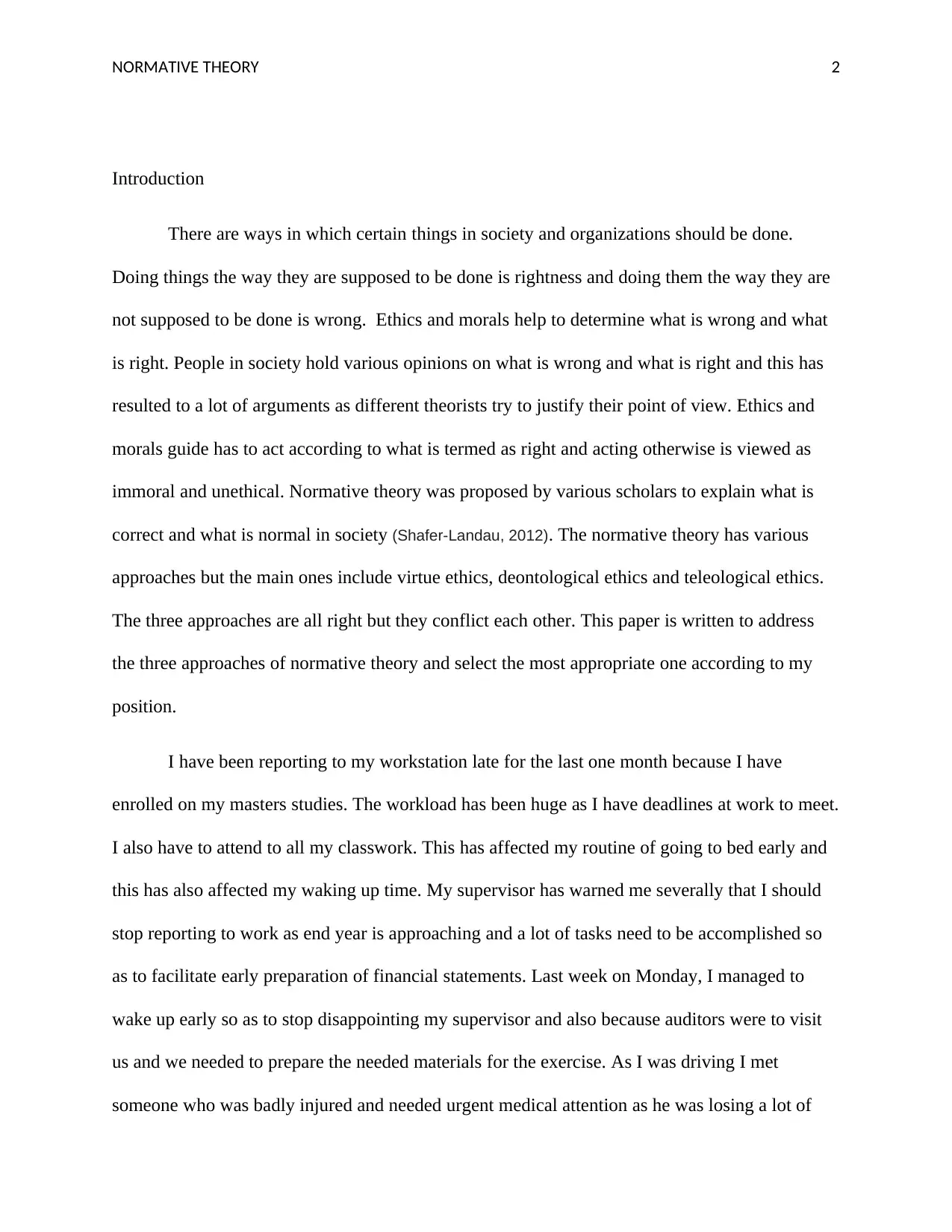
NORMATIVE THEORY 2
Introduction
There are ways in which certain things in society and organizations should be done.
Doing things the way they are supposed to be done is rightness and doing them the way they are
not supposed to be done is wrong. Ethics and morals help to determine what is wrong and what
is right. People in society hold various opinions on what is wrong and what is right and this has
resulted to a lot of arguments as different theorists try to justify their point of view. Ethics and
morals guide has to act according to what is termed as right and acting otherwise is viewed as
immoral and unethical. Normative theory was proposed by various scholars to explain what is
correct and what is normal in society (Shafer-Landau, 2012). The normative theory has various
approaches but the main ones include virtue ethics, deontological ethics and teleological ethics.
The three approaches are all right but they conflict each other. This paper is written to address
the three approaches of normative theory and select the most appropriate one according to my
position.
I have been reporting to my workstation late for the last one month because I have
enrolled on my masters studies. The workload has been huge as I have deadlines at work to meet.
I also have to attend to all my classwork. This has affected my routine of going to bed early and
this has also affected my waking up time. My supervisor has warned me severally that I should
stop reporting to work as end year is approaching and a lot of tasks need to be accomplished so
as to facilitate early preparation of financial statements. Last week on Monday, I managed to
wake up early so as to stop disappointing my supervisor and also because auditors were to visit
us and we needed to prepare the needed materials for the exercise. As I was driving I met
someone who was badly injured and needed urgent medical attention as he was losing a lot of
Introduction
There are ways in which certain things in society and organizations should be done.
Doing things the way they are supposed to be done is rightness and doing them the way they are
not supposed to be done is wrong. Ethics and morals help to determine what is wrong and what
is right. People in society hold various opinions on what is wrong and what is right and this has
resulted to a lot of arguments as different theorists try to justify their point of view. Ethics and
morals guide has to act according to what is termed as right and acting otherwise is viewed as
immoral and unethical. Normative theory was proposed by various scholars to explain what is
correct and what is normal in society (Shafer-Landau, 2012). The normative theory has various
approaches but the main ones include virtue ethics, deontological ethics and teleological ethics.
The three approaches are all right but they conflict each other. This paper is written to address
the three approaches of normative theory and select the most appropriate one according to my
position.
I have been reporting to my workstation late for the last one month because I have
enrolled on my masters studies. The workload has been huge as I have deadlines at work to meet.
I also have to attend to all my classwork. This has affected my routine of going to bed early and
this has also affected my waking up time. My supervisor has warned me severally that I should
stop reporting to work as end year is approaching and a lot of tasks need to be accomplished so
as to facilitate early preparation of financial statements. Last week on Monday, I managed to
wake up early so as to stop disappointing my supervisor and also because auditors were to visit
us and we needed to prepare the needed materials for the exercise. As I was driving I met
someone who was badly injured and needed urgent medical attention as he was losing a lot of
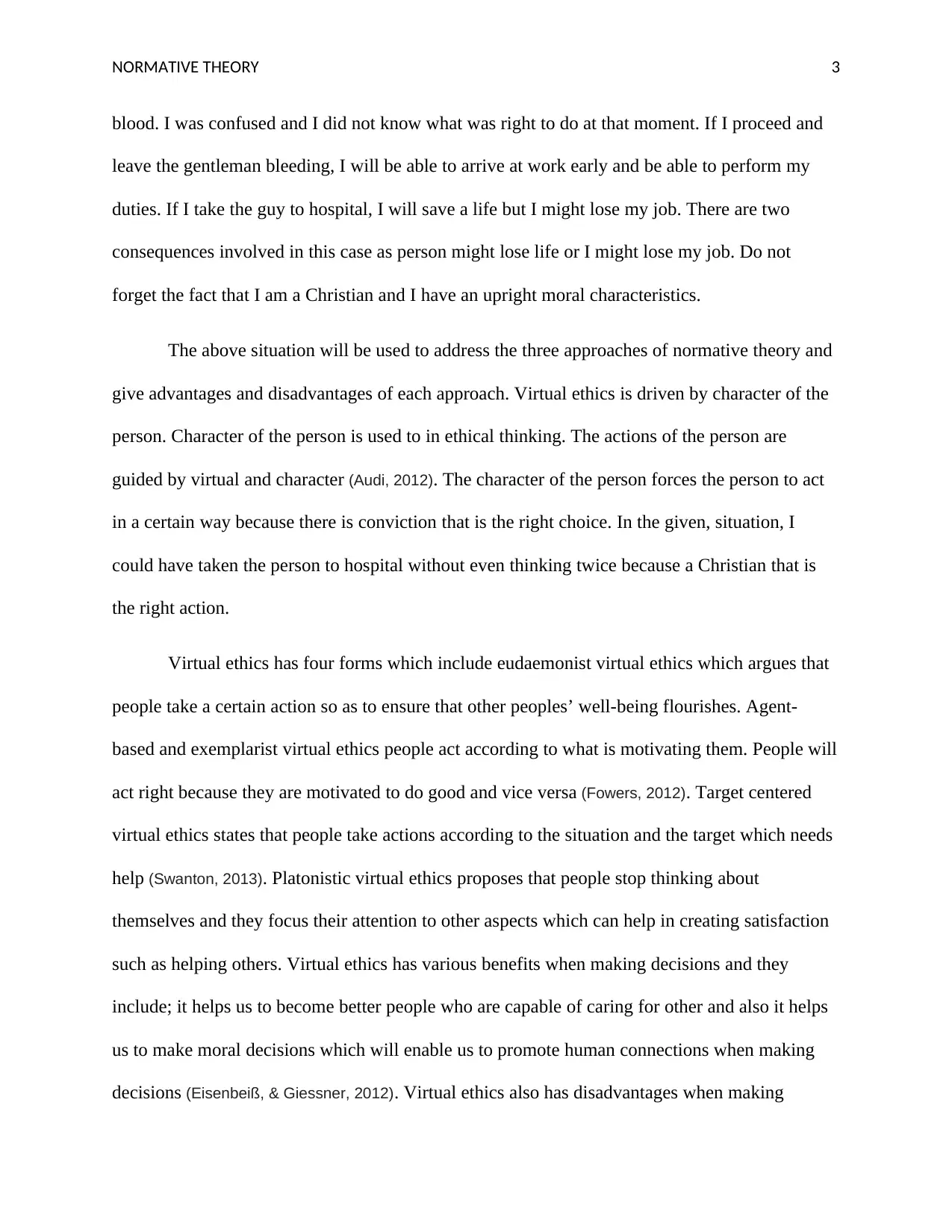
NORMATIVE THEORY 3
blood. I was confused and I did not know what was right to do at that moment. If I proceed and
leave the gentleman bleeding, I will be able to arrive at work early and be able to perform my
duties. If I take the guy to hospital, I will save a life but I might lose my job. There are two
consequences involved in this case as person might lose life or I might lose my job. Do not
forget the fact that I am a Christian and I have an upright moral characteristics.
The above situation will be used to address the three approaches of normative theory and
give advantages and disadvantages of each approach. Virtual ethics is driven by character of the
person. Character of the person is used to in ethical thinking. The actions of the person are
guided by virtual and character (Audi, 2012). The character of the person forces the person to act
in a certain way because there is conviction that is the right choice. In the given, situation, I
could have taken the person to hospital without even thinking twice because a Christian that is
the right action.
Virtual ethics has four forms which include eudaemonist virtual ethics which argues that
people take a certain action so as to ensure that other peoples’ well-being flourishes. Agent-
based and exemplarist virtual ethics people act according to what is motivating them. People will
act right because they are motivated to do good and vice versa (Fowers, 2012). Target centered
virtual ethics states that people take actions according to the situation and the target which needs
help (Swanton, 2013). Platonistic virtual ethics proposes that people stop thinking about
themselves and they focus their attention to other aspects which can help in creating satisfaction
such as helping others. Virtual ethics has various benefits when making decisions and they
include; it helps us to become better people who are capable of caring for other and also it helps
us to make moral decisions which will enable us to promote human connections when making
decisions (Eisenbeiß, & Giessner, 2012). Virtual ethics also has disadvantages when making
blood. I was confused and I did not know what was right to do at that moment. If I proceed and
leave the gentleman bleeding, I will be able to arrive at work early and be able to perform my
duties. If I take the guy to hospital, I will save a life but I might lose my job. There are two
consequences involved in this case as person might lose life or I might lose my job. Do not
forget the fact that I am a Christian and I have an upright moral characteristics.
The above situation will be used to address the three approaches of normative theory and
give advantages and disadvantages of each approach. Virtual ethics is driven by character of the
person. Character of the person is used to in ethical thinking. The actions of the person are
guided by virtual and character (Audi, 2012). The character of the person forces the person to act
in a certain way because there is conviction that is the right choice. In the given, situation, I
could have taken the person to hospital without even thinking twice because a Christian that is
the right action.
Virtual ethics has four forms which include eudaemonist virtual ethics which argues that
people take a certain action so as to ensure that other peoples’ well-being flourishes. Agent-
based and exemplarist virtual ethics people act according to what is motivating them. People will
act right because they are motivated to do good and vice versa (Fowers, 2012). Target centered
virtual ethics states that people take actions according to the situation and the target which needs
help (Swanton, 2013). Platonistic virtual ethics proposes that people stop thinking about
themselves and they focus their attention to other aspects which can help in creating satisfaction
such as helping others. Virtual ethics has various benefits when making decisions and they
include; it helps us to become better people who are capable of caring for other and also it helps
us to make moral decisions which will enable us to promote human connections when making
decisions (Eisenbeiß, & Giessner, 2012). Virtual ethics also has disadvantages when making
⊘ This is a preview!⊘
Do you want full access?
Subscribe today to unlock all pages.

Trusted by 1+ million students worldwide
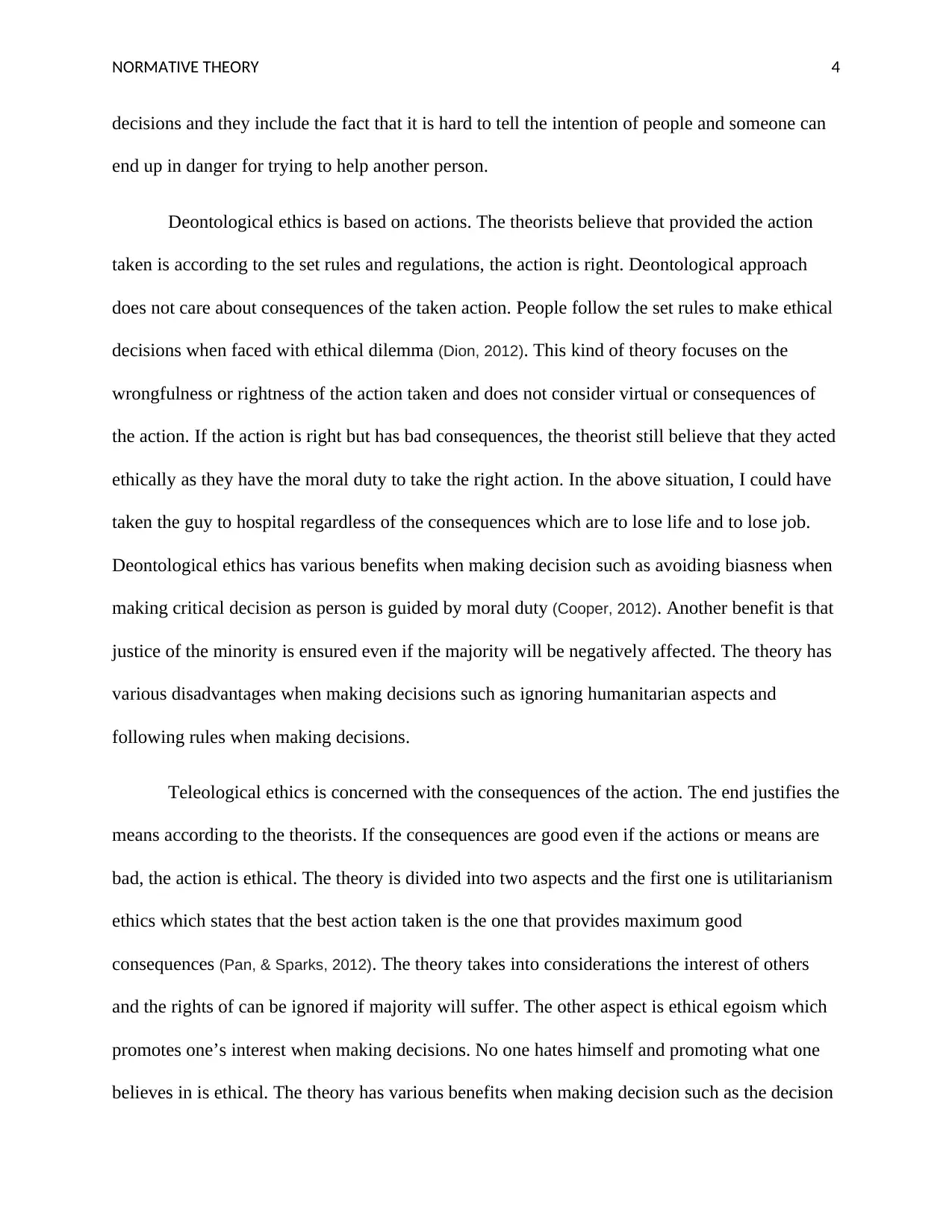
NORMATIVE THEORY 4
decisions and they include the fact that it is hard to tell the intention of people and someone can
end up in danger for trying to help another person.
Deontological ethics is based on actions. The theorists believe that provided the action
taken is according to the set rules and regulations, the action is right. Deontological approach
does not care about consequences of the taken action. People follow the set rules to make ethical
decisions when faced with ethical dilemma (Dion, 2012). This kind of theory focuses on the
wrongfulness or rightness of the action taken and does not consider virtual or consequences of
the action. If the action is right but has bad consequences, the theorist still believe that they acted
ethically as they have the moral duty to take the right action. In the above situation, I could have
taken the guy to hospital regardless of the consequences which are to lose life and to lose job.
Deontological ethics has various benefits when making decision such as avoiding biasness when
making critical decision as person is guided by moral duty (Cooper, 2012). Another benefit is that
justice of the minority is ensured even if the majority will be negatively affected. The theory has
various disadvantages when making decisions such as ignoring humanitarian aspects and
following rules when making decisions.
Teleological ethics is concerned with the consequences of the action. The end justifies the
means according to the theorists. If the consequences are good even if the actions or means are
bad, the action is ethical. The theory is divided into two aspects and the first one is utilitarianism
ethics which states that the best action taken is the one that provides maximum good
consequences (Pan, & Sparks, 2012). The theory takes into considerations the interest of others
and the rights of can be ignored if majority will suffer. The other aspect is ethical egoism which
promotes one’s interest when making decisions. No one hates himself and promoting what one
believes in is ethical. The theory has various benefits when making decision such as the decision
decisions and they include the fact that it is hard to tell the intention of people and someone can
end up in danger for trying to help another person.
Deontological ethics is based on actions. The theorists believe that provided the action
taken is according to the set rules and regulations, the action is right. Deontological approach
does not care about consequences of the taken action. People follow the set rules to make ethical
decisions when faced with ethical dilemma (Dion, 2012). This kind of theory focuses on the
wrongfulness or rightness of the action taken and does not consider virtual or consequences of
the action. If the action is right but has bad consequences, the theorist still believe that they acted
ethically as they have the moral duty to take the right action. In the above situation, I could have
taken the guy to hospital regardless of the consequences which are to lose life and to lose job.
Deontological ethics has various benefits when making decision such as avoiding biasness when
making critical decision as person is guided by moral duty (Cooper, 2012). Another benefit is that
justice of the minority is ensured even if the majority will be negatively affected. The theory has
various disadvantages when making decisions such as ignoring humanitarian aspects and
following rules when making decisions.
Teleological ethics is concerned with the consequences of the action. The end justifies the
means according to the theorists. If the consequences are good even if the actions or means are
bad, the action is ethical. The theory is divided into two aspects and the first one is utilitarianism
ethics which states that the best action taken is the one that provides maximum good
consequences (Pan, & Sparks, 2012). The theory takes into considerations the interest of others
and the rights of can be ignored if majority will suffer. The other aspect is ethical egoism which
promotes one’s interest when making decisions. No one hates himself and promoting what one
believes in is ethical. The theory has various benefits when making decision such as the decision
Paraphrase This Document
Need a fresh take? Get an instant paraphrase of this document with our AI Paraphraser
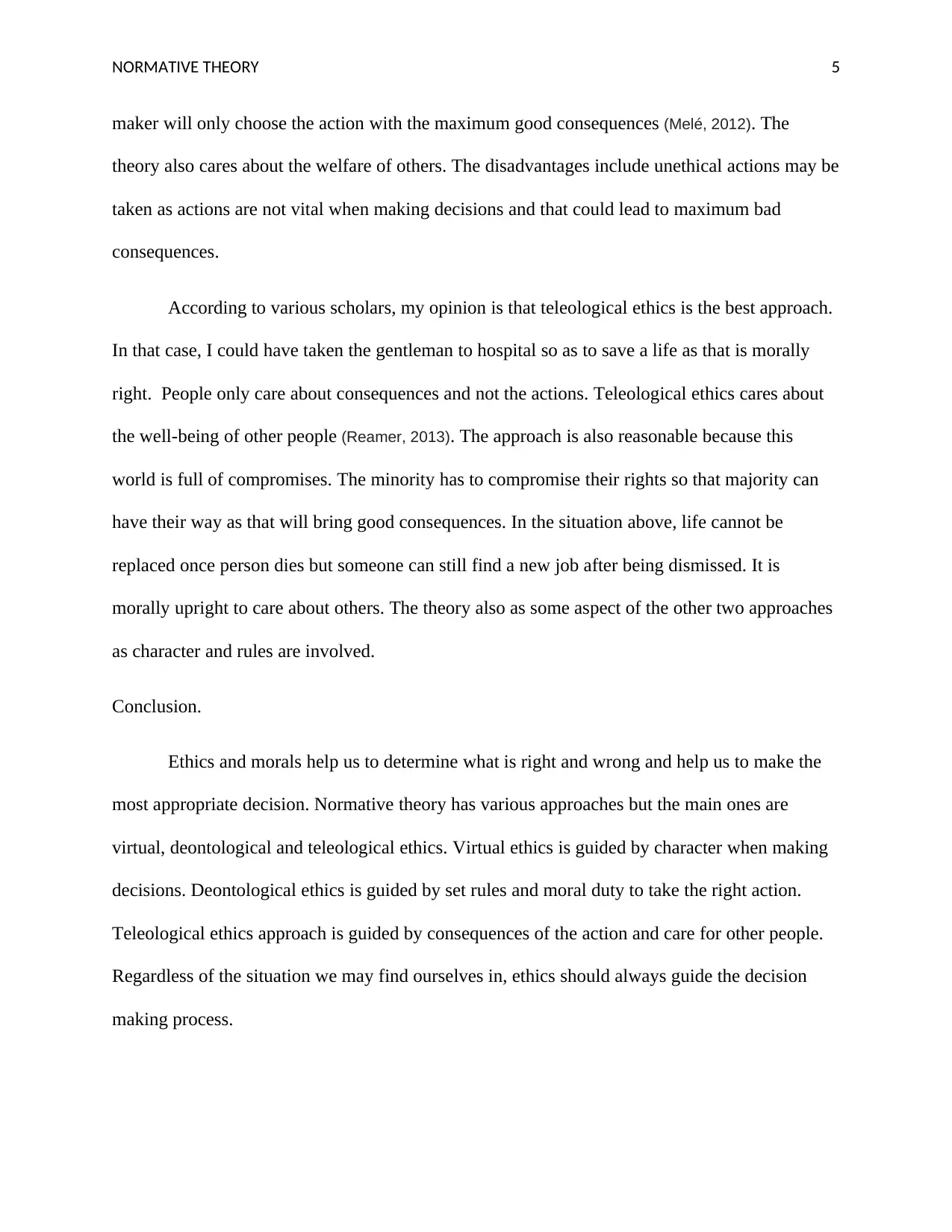
NORMATIVE THEORY 5
maker will only choose the action with the maximum good consequences (Melé, 2012). The
theory also cares about the welfare of others. The disadvantages include unethical actions may be
taken as actions are not vital when making decisions and that could lead to maximum bad
consequences.
According to various scholars, my opinion is that teleological ethics is the best approach.
In that case, I could have taken the gentleman to hospital so as to save a life as that is morally
right. People only care about consequences and not the actions. Teleological ethics cares about
the well-being of other people (Reamer, 2013). The approach is also reasonable because this
world is full of compromises. The minority has to compromise their rights so that majority can
have their way as that will bring good consequences. In the situation above, life cannot be
replaced once person dies but someone can still find a new job after being dismissed. It is
morally upright to care about others. The theory also as some aspect of the other two approaches
as character and rules are involved.
Conclusion.
Ethics and morals help us to determine what is right and wrong and help us to make the
most appropriate decision. Normative theory has various approaches but the main ones are
virtual, deontological and teleological ethics. Virtual ethics is guided by character when making
decisions. Deontological ethics is guided by set rules and moral duty to take the right action.
Teleological ethics approach is guided by consequences of the action and care for other people.
Regardless of the situation we may find ourselves in, ethics should always guide the decision
making process.
maker will only choose the action with the maximum good consequences (Melé, 2012). The
theory also cares about the welfare of others. The disadvantages include unethical actions may be
taken as actions are not vital when making decisions and that could lead to maximum bad
consequences.
According to various scholars, my opinion is that teleological ethics is the best approach.
In that case, I could have taken the gentleman to hospital so as to save a life as that is morally
right. People only care about consequences and not the actions. Teleological ethics cares about
the well-being of other people (Reamer, 2013). The approach is also reasonable because this
world is full of compromises. The minority has to compromise their rights so that majority can
have their way as that will bring good consequences. In the situation above, life cannot be
replaced once person dies but someone can still find a new job after being dismissed. It is
morally upright to care about others. The theory also as some aspect of the other two approaches
as character and rules are involved.
Conclusion.
Ethics and morals help us to determine what is right and wrong and help us to make the
most appropriate decision. Normative theory has various approaches but the main ones are
virtual, deontological and teleological ethics. Virtual ethics is guided by character when making
decisions. Deontological ethics is guided by set rules and moral duty to take the right action.
Teleological ethics approach is guided by consequences of the action and care for other people.
Regardless of the situation we may find ourselves in, ethics should always guide the decision
making process.
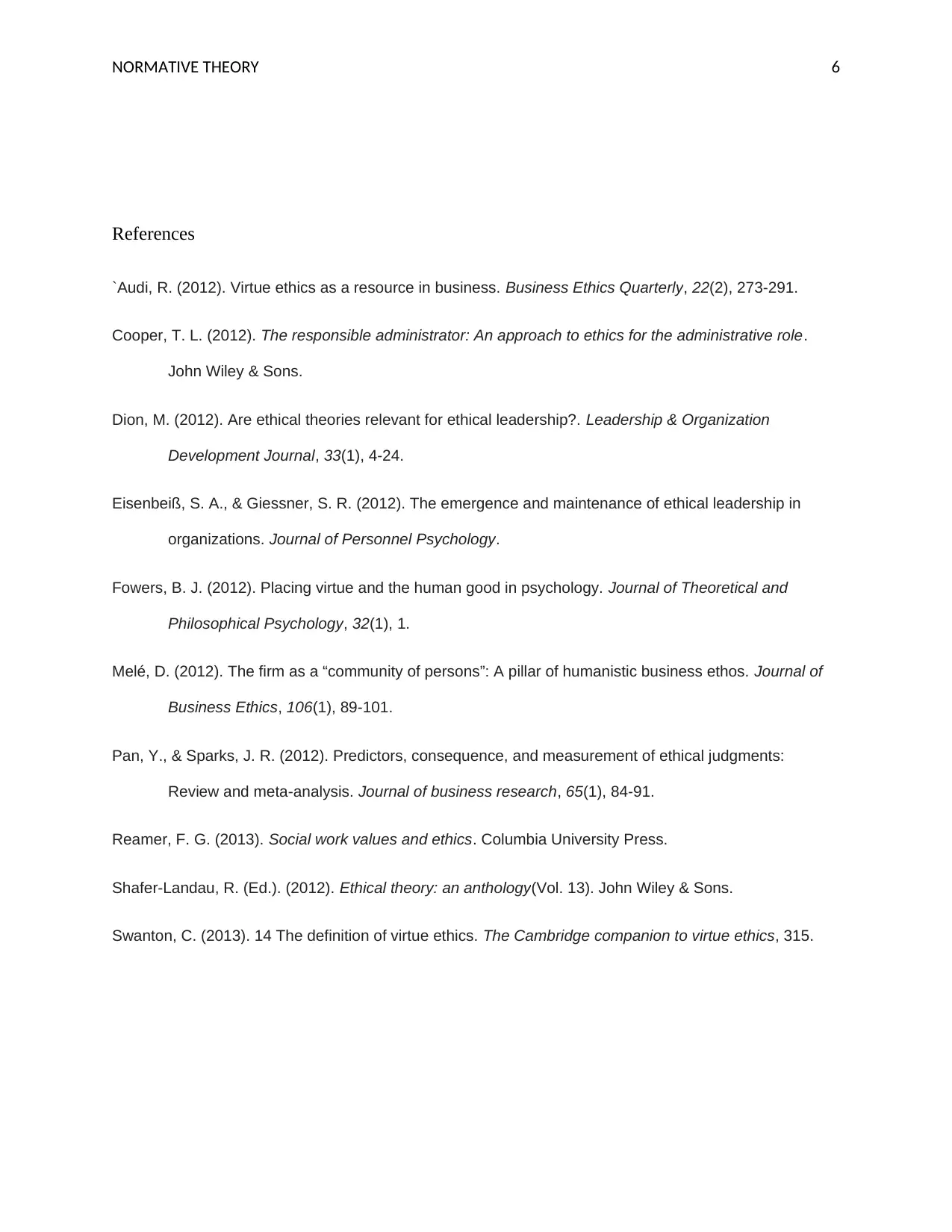
NORMATIVE THEORY 6
References
`Audi, R. (2012). Virtue ethics as a resource in business. Business Ethics Quarterly, 22(2), 273-291.
Cooper, T. L. (2012). The responsible administrator: An approach to ethics for the administrative role.
John Wiley & Sons.
Dion, M. (2012). Are ethical theories relevant for ethical leadership?. Leadership & Organization
Development Journal, 33(1), 4-24.
Eisenbeiß, S. A., & Giessner, S. R. (2012). The emergence and maintenance of ethical leadership in
organizations. Journal of Personnel Psychology.
Fowers, B. J. (2012). Placing virtue and the human good in psychology. Journal of Theoretical and
Philosophical Psychology, 32(1), 1.
Melé, D. (2012). The firm as a “community of persons”: A pillar of humanistic business ethos. Journal of
Business Ethics, 106(1), 89-101.
Pan, Y., & Sparks, J. R. (2012). Predictors, consequence, and measurement of ethical judgments:
Review and meta-analysis. Journal of business research, 65(1), 84-91.
Reamer, F. G. (2013). Social work values and ethics. Columbia University Press.
Shafer-Landau, R. (Ed.). (2012). Ethical theory: an anthology(Vol. 13). John Wiley & Sons.
Swanton, C. (2013). 14 The definition of virtue ethics. The Cambridge companion to virtue ethics, 315.
References
`Audi, R. (2012). Virtue ethics as a resource in business. Business Ethics Quarterly, 22(2), 273-291.
Cooper, T. L. (2012). The responsible administrator: An approach to ethics for the administrative role.
John Wiley & Sons.
Dion, M. (2012). Are ethical theories relevant for ethical leadership?. Leadership & Organization
Development Journal, 33(1), 4-24.
Eisenbeiß, S. A., & Giessner, S. R. (2012). The emergence and maintenance of ethical leadership in
organizations. Journal of Personnel Psychology.
Fowers, B. J. (2012). Placing virtue and the human good in psychology. Journal of Theoretical and
Philosophical Psychology, 32(1), 1.
Melé, D. (2012). The firm as a “community of persons”: A pillar of humanistic business ethos. Journal of
Business Ethics, 106(1), 89-101.
Pan, Y., & Sparks, J. R. (2012). Predictors, consequence, and measurement of ethical judgments:
Review and meta-analysis. Journal of business research, 65(1), 84-91.
Reamer, F. G. (2013). Social work values and ethics. Columbia University Press.
Shafer-Landau, R. (Ed.). (2012). Ethical theory: an anthology(Vol. 13). John Wiley & Sons.
Swanton, C. (2013). 14 The definition of virtue ethics. The Cambridge companion to virtue ethics, 315.
⊘ This is a preview!⊘
Do you want full access?
Subscribe today to unlock all pages.

Trusted by 1+ million students worldwide
1 out of 6
Related Documents
Your All-in-One AI-Powered Toolkit for Academic Success.
+13062052269
info@desklib.com
Available 24*7 on WhatsApp / Email
![[object Object]](/_next/static/media/star-bottom.7253800d.svg)
Unlock your academic potential
Copyright © 2020–2026 A2Z Services. All Rights Reserved. Developed and managed by ZUCOL.





